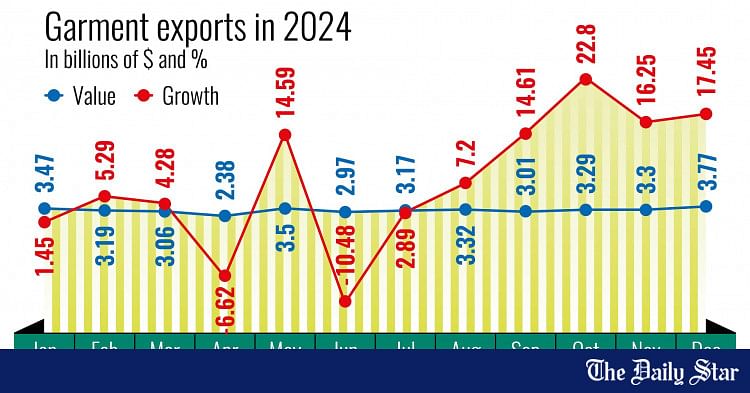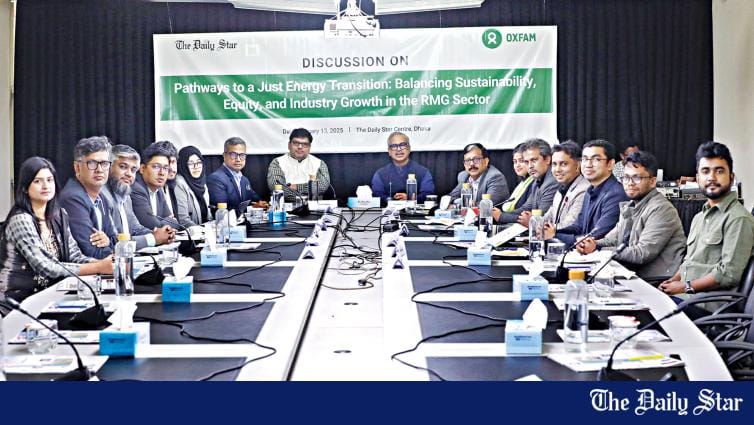Saif
Senior Member
- Joined
- Jan 24, 2024
- Messages
- 15,397
- Reaction score
- 7,874
- Nation

- Residence

- Axis Group


RMG machinery, allied products mega-expo starts Jan 8 in Dhaka
A four-day international trade show on machinery for the garment industry and allied products is set to begin on January 8 in Dhaka. The mega-exhibition is arranged to showcase the apparel industry's latest technology and garments accessories and packaging. The event combining different trade sho
RMG machinery, allied products mega-expo starts Jan 8 in Dhaka
UNB
Published :
Jan 05, 2025 22:34
Updated :
Jan 05, 2025 22:34

A four-day international trade show on machinery for the garment industry and allied products is set to begin on January 8 in Dhaka.
The mega-exhibition is arranged to showcase the apparel industry's latest technology and garments accessories and packaging.
The event combining different trade shows will be held from January 8-11 at the International Convention City Bashundhara (ICCB) in the capital. It includes the 22nd edition of Garment Technology Show Bangladesh 2025 (GTB 2025) which is also known as International Tradeshow on Apparel Machinery and Allied Products and the 14th edition of International Garment Accessories and Packaging Expo 2025.
The trade shows will be organised jointly with the Bangladesh Garment Accessories and Packaging Manufacturers and Exporters Association (BGAPMEA) and ASK Trade and Exhibition Pvt Limited. The GAPEXPO will be showcasing products, types of machinery, and raw materials.
Md Shahriar, president of the BGAPMEA, revealed this at a pre-event press conference in the capital on Sunday.
He said that the garments accessories and packaging industry acts as a backward linkage industry for the country's readymade garment (RMG) sector.
He also said that Bangladesh was fully import-dependent for RMG accessories and packaging materials earlier. Currently, over 60 items are produced locally for export-oriented apparel industries and some are also exporting directly.
He also said that to introduce the sector and to find buyers the GAPEXPO plays a crucial role.
In this year's tradeshow, about 500 exhibitors from 25 countries are showcasing the latest technology in terms of machines and software used in every process of production, he added.
UNB
Published :
Jan 05, 2025 22:34
Updated :
Jan 05, 2025 22:34
A four-day international trade show on machinery for the garment industry and allied products is set to begin on January 8 in Dhaka.
The mega-exhibition is arranged to showcase the apparel industry's latest technology and garments accessories and packaging.
The event combining different trade shows will be held from January 8-11 at the International Convention City Bashundhara (ICCB) in the capital. It includes the 22nd edition of Garment Technology Show Bangladesh 2025 (GTB 2025) which is also known as International Tradeshow on Apparel Machinery and Allied Products and the 14th edition of International Garment Accessories and Packaging Expo 2025.
The trade shows will be organised jointly with the Bangladesh Garment Accessories and Packaging Manufacturers and Exporters Association (BGAPMEA) and ASK Trade and Exhibition Pvt Limited. The GAPEXPO will be showcasing products, types of machinery, and raw materials.
Md Shahriar, president of the BGAPMEA, revealed this at a pre-event press conference in the capital on Sunday.
He said that the garments accessories and packaging industry acts as a backward linkage industry for the country's readymade garment (RMG) sector.
He also said that Bangladesh was fully import-dependent for RMG accessories and packaging materials earlier. Currently, over 60 items are produced locally for export-oriented apparel industries and some are also exporting directly.
He also said that to introduce the sector and to find buyers the GAPEXPO plays a crucial role.
In this year's tradeshow, about 500 exhibitors from 25 countries are showcasing the latest technology in terms of machines and software used in every process of production, he added.





